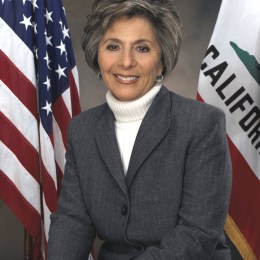
In July 1994, during the Second Session of the 103rd Congress, Sen. Barbara Boxer and seven other United States senators came to my aid. North Carolina Republican Sen. Jesse Helms, informed of my first-of-its-kind position as a gay employment counselor for the federal government, pushed through the Senate an amendment to an appropriations bill that would defund my work and effectively terminate me.
Defunding people and programs was a popular legislative maneuver by Helms in those early years of the Clinton Administration when Democrats controlled both Chambers of Congress and Republicans fought back as best they could. It was this maneuver and other legislative manipulation that earned Jesse Helms the nickname of “Master Parliamentarian.” Jesse also liked the nickname “Senator No” because he never liked or voted for spending bills for progressive legislative issues. I had a few nicknames for the old boy myself.
Helms offered several anti-gay amendments to the appropriations bill, H.R. 4554; only one passed. It was an especially dirty-minded amendment based on a draft of my job description as a gay employment manager, which I did not write.
The Helms amendment was titled “Ending the Use of Taxpayer Funds to Encourage Employees To Accept Homosexuality as a Legitimate or Normal Lifestyle.” It read as follows:
“None of the funds made available under this Act maybe used to fund, promote, or carry out any seminar or program for employees of the U.S. Department of Agriculture, or to fund any position in the Department of Agriculture, the purpose of which is to compel, instruct, encourage, urge, or persuade employees to –
(1) Recruit on the basis of sexual orientation homosexuals for employment at the Department of Agriculture; or
(2) Embrace, accept, condone, or celebrate homosexuality as a legitimate or normal lifestyle.”
The Helms amendment passed the Senate by a vote of 92-8. Sen. Barbara Boxer voted against Helms as did Sens. Patty Murray, Russell Feingold, and four other Democrats now deceased: Edward Kennedy, Daniel Moynihan, Claiborne Pell and Paul Wellstone. Also voting against Helms was Bob Packwood, a liberal Oregon Republican, who resigned from the Senate in September 1995 amid sexual misconduct allegations.
Those voting with Helms on his anti-gay amendment included traditional LGBT allies such as Sens. Dianne Feinstein, John F. Kerry, Iowa’s Tom Harkin, Maryland’s Barbara Mikulski and Illinois’ Carol Moseley Braun. I suppose it safe to say these five senators and many others have evolved on gay issues since 1994 and are now solidly in the pink LGBT corner on employment, marriage and full equality under the law.
Of the eight senators who voted against Jesse Helms, I personally met and thanked four. I thanked Packwood at a meeting at the Library of Congress after this resignation. I thanked Wellstone in Washington at a memorial service for a mutual friend in 2002. In 2005 I thanked Kennedy at the 80th birthday party for Michigan Congressman John Dingell held at the National Building Museum. I thanked Boxer at events in California and Washington, D.C.
With Sen. Barbara Boxer retiring from the U.S. Senate, only brave Washington Sen. Patty Murray remains. Feingold was defeated for re-election in 2010 and is currently challenging incumbent GOP Sen. Ron Johnson, chair of the Homeland Security and Government Affairs Committee, to return to Washington. The Johnson-Feingold race is too close to call according to independent Wisconsin sources.
The July 19, 1994, Helms move to deny LGBT workers even limited employment rights in the federal government was a moment in time and an important moment in the LGBT fight for employment equality. The Helms amendment to the appropriations bill succeeded and he planned to use it over and over to stop LGBT employment efforts at other agencies. He intended to send a signal to employers across the nation that the federal government would deny LGBT workers employment opportunities and private sector employers could use the Helms Model to do so as well.
The offensive Helms amendment was eventually stripped from the appropriations bill in 1994 but not without a long fight. The larger issue of LGBT workplace fairness and non-discrimination labors on nearly 25 years later. Poor Congressional leadership, politically divisive debate, ineffective and offensive lobbying, fundraising profiteering, are among the many reasons LGBT workers still suffer economically and personally from discrimination, professional marginalization, under-employment and unemployment.
The Helms anti-gay amendment almost became law in the 96-page appropriations bill. Clear heads prevailed and the amendment was struck from the final bill during conference and never became law. If it had, Jesse would have amended every Senate bill with anti-gay amendments. In fact, he did try it other times, usually after encounters with gay protesters angry over his hateful and hurtful legislative efforts to prevent or restrict funding for HIV/AIDS services and prevention programs.
It took great courage for the eight senators to vote against Helms in 1994. Today the Congressional battle for LGBT employment rights continues as LGBT workers continue to suffer hard economic burdens of discrimination, whether blatant or subtle.
The Senate of 2016 is not without lawmakers who have the courage to stand and vote against the conservative followers of Jesse Helms, who died in 2008, and whatever anti-gay legislation they might propose. The Senate Eight Against Hate, including Sens. Boxer and Murray, are true heroes and heroines to the LGBT community. They fought for LGBT employment rights when it counted.
Longtime diplomat Jim Patterson is a Washington, D.C.-based writer, speaker and a member of the California State Society. JEPCapitolHill@gmail.com











